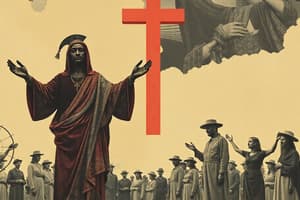Podcast
Questions and Answers
What central text serves as the foundational scripture for Christianity?
What central text serves as the foundational scripture for Christianity?
- The Torah
- The Bhagavad Gita
- The Bible (correct)
- The Quran
Which of the following concepts represents the belief in one God in Christianity?
Which of the following concepts represents the belief in one God in Christianity?
- Polytheism
- Monotheism (correct)
- Atheism
- Deism
What is the significance of the Trinity in Christian theology?
What is the significance of the Trinity in Christian theology?
- Understanding God as three persons in one (correct)
- The notion of multiple gods ruling the universe
- An ancient practice of worshipping three deities
- God being present in three different religions
Which branch of Christianity is known for being led by the Pope?
Which branch of Christianity is known for being led by the Pope?
What is one of the two important sacraments practiced in Christianity?
What is one of the two important sacraments practiced in Christianity?
Which ethical teaching emphasizes the importance of loving others in Christianity?
Which ethical teaching emphasizes the importance of loving others in Christianity?
Who is considered the central figure of Christianity?
Who is considered the central figure of Christianity?
What major historical event in the 16th century led to the emergence of Protestantism?
What major historical event in the 16th century led to the emergence of Protestantism?
What is a key contemporary issue related to Christianity and society?
What is a key contemporary issue related to Christianity and society?
Which aspect of Christianity emphasizes helping the less fortunate?
Which aspect of Christianity emphasizes helping the less fortunate?
Flashcards are hidden until you start studying
Study Notes
Overview of Christianity
- Origin: Christianity emerged in the 1st century CE in Judea.
- Foundational Texts: The Bible, consisting of the Old Testament and the New Testament.
- Key Figure: Jesus Christ, believed to be the Messiah and Son of God.
Core Beliefs
- Monotheism: Belief in one God.
- The Trinity: Understanding of God as three persons in one: Father, Son (Jesus Christ), and Holy Spirit.
- Salvation: Achieved through faith in Jesus Christ.
- Grace: Unmerited favor from God, essential for salvation.
- Eternal Life: Promise of life after death for believers.
Major Branches
- Roman Catholicism: Led by the Pope, emphasizes tradition and the sacraments.
- Eastern Orthodoxy: Focuses on liturgy, tradition, and the use of icons.
- Protestantism: Began in the 16th century; emphasizes scripture and faith alone. Includes sub-denominations like Baptists, Methodists, Lutherans, etc.
Practices
- Worship Services: Regular gatherings for prayer, singing, and preaching.
- Sacraments: Important rituals like Baptism and Eucharist (Communion).
- Prayer: Personal and corporate communication with God.
Ethical Teachings
- Love and Compassion: Fundamental to Christian behavior (e.g., "Love your neighbor").
- The Ten Commandments: Guidelines for moral conduct.
- Social Justice: Emphasis on helping the less fortunate and promoting peace.
Religious Texts
- The Bible: Central text; different denominations may vary in canon.
- Creeds: Formal statements of Christian beliefs (e.g., Nicene Creed).
Historical Development
- Early Church: Growth through apostles; establishment of councils.
- Middle Ages: Rise of the Catholic Church; schism between East and West.
- Reformation: 16th-century movement leading to Protestantism.
Contemporary Issues
- Interfaith Dialogue: Discussions and cooperation between different religions.
- Secularism: Influence of non-religious perspectives in societal contexts.
- Church and State: Ongoing debates about the separation of religion and government.
Global Christianity
- Diversity: Christianity is practiced globally, with significant populations in Europe, the Americas, Africa, and Asia.
- Missionary Work: Efforts to spread Christianity and support communities worldwide.
Key Figures
- Jesus Christ: Central figure of Christianity.
- Paul the Apostle: Prominent early Church leader and writer of many New Testament letters.
- Martin Luther: Key figure in the Reformation, initiating the Protestant movement.
Important Festivals
- Christmas: Celebration of the birth of Jesus.
- Easter: Commemorates the resurrection of Jesus.
- Pentecost: Marks the descent of the Holy Spirit on the apostles.
Origin and Foundational Texts
- Christianity emerged in the 1st century CE in Judea, with its core beliefs centered around the life and teachings of Jesus Christ.
- The Bible serves as the foundational text of Christianity, composed of the Old and New Testaments.
Core Beliefs
- Emphasizes monotheism, the belief in one God.
- A cornerstone of Christian belief is the Trinity, which posits that God exists as three distinct persons in one being: the Father, the Son (Jesus Christ), and the Holy Spirit.
- The concept of salvation, achieved through faith in Jesus Christ, is central to Christian thought.
- Grace, defined as God's unmerited favor, is fundamental to the attainment of salvation.
- Christianity promises eternal life after death for believers.
Major Branches
- Roman Catholicism: The largest Christian denomination, led by the Pope, strongly emphasizes tradition and the observance of sacraments.
- Eastern Orthodoxy: Emphasizes liturgy, tradition, and the use of icons, and maintains a distinct theological and liturgical emphasis.
- Protestantism: Originating in the 16th century, it emphasizes scriptural authority and the principle of "salvation by faith alone." It encompasses a diverse range of denominations, including Baptists, Methodists, Lutherans, and many others.
Practices
- Regular worship services are central to Christian practice, providing opportunities for prayer, congregational singing, and sermons.
- Sacraments, such as Baptism and Eucharist (Communion), are considered significant rituals in many Christian denominations.
- Prayer, both personal and communal, is a cornerstone of Christian life, serving as a means of communication with God.
Ethical Teachings
- Love and compassion are fundamental to Christian ethics.
- The Ten Commandments provide guidelines for moral conduct.
- Social justice is a significant emphasis in Christianity, advocating for the welfare of the less fortunate and promoting peace.
Historical Development
- Early Church: The early church grew through the work of the apostles, leading to the establishment of church councils that defined key doctrines.
- Middle Ages: Marked by the ascendancy of the Catholic Church, as well as the schism between the Eastern and Western branches of Christianity.
- Reformation: A pivotal movement in the 16th century, which led to the emergence of Protestantism.
Contemporary Issues
- Interfaith Dialogue: Increasingly, there's a growing dialogue between different faith traditions, fostering understanding and cooperation.
- Secularism: The influence of non-religious perspectives continues to grow in societies, impacting the role of Christianity in public life.
- Church and State: The relationship between church and state remains a subject of ongoing debate, particularly regarding the separation of powers.
Global Christianity
- Christianity is a global religion, with significant populations in Europe, the Americas, Africa, and Asia.
- Missionary Work: A key aspect of Christianity involves spreading the faith and supporting communities worldwide.
Key Figures
- Jesus Christ: The central figure of Christianity.
- Paul the Apostle: A prominent early Church leader and writer of many New Testament letters.
- Martin Luther: A pivotal figure in the Reformation, initiating the Protestant movement.
Important Festivals
- Christmas: Celebrates the birth of Jesus Christ.
- Easter: Commemorates the resurrection of Jesus Christ.
- Pentecost: Marks the descent of the Holy Spirit on the apostles.
Studying That Suits You
Use AI to generate personalized quizzes and flashcards to suit your learning preferences.




